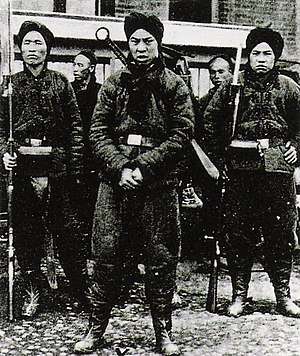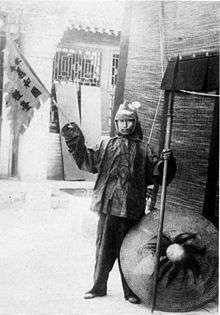Yìhéquán
| Boxers | |
|---|---|
 Boxer soldiers | |
| Active | 1890s–1901 |
| Country |
|
| Allegiance |
|
| Size | 50,000–100,000 |
| Motto(s) |
"Overthrow the Qing, destroy foreigners!" (1898–1900) "Support the Qing, destroy foreigners!" (1900–1901) |
| Equipment | Spears, halberds |
| Engagements | Boxer Rebellion |
| Commanders | |
| Notable commanders |
Cao Futian |

The Yihequan (Chinese: 義和拳; pinyin: Yìhéquán), or Fists of Harmony and Justice (also named Yihetuan (Chinese: 義和團; pinyin: Yìhétuán), League of Harmony and Justice), was a Chinese secret society known for having triggered the Boxer Rebellion. It became a massive movement, counting between 50,000 and 100,000 members. The society led xenophobic actions, first hostile towards the Qing Manchu dynasty then allied with it to fight Westerners, Japanese and Christians. In the Western world, the society was mainly known as the "Boxers", due to its members' practice of Kung Fu, at the time called "Chinese boxing".[1][2]
Origins
Throughout history, China has had a tradition of secret societies. The political history of the Chinese Empire is filled with rebellions, often led by such societies backed by peasants during agricultural crises. The Boxer movement fits exactly in this description. It probably appeared in the Shandong during the beginning of the 1890s, as an heir of the Eight Trigram Sect (Bagua Jiao), who started the Eight Trigrams uprising of 1813.
Yi-he boxing, as it was later practised by the Fists of Harmony and Justice, long predated the movement. In 1779, the Qing government already investigated rumours according to which a man named Yang practised this martial arts style in Guan County, Shandong, though state authorities were unable to confirm this at the time.[3]
The movement was composed of illiterate people. First and foremost peasants, to which were added idle youth, ruined artisans and laid off workers.[4] Some Boxer recruits were disbanded imperial soldiers and local militiamen.[5]

The movement was organised in several groups, that each had their chief, commanding between 25 and 100 men. While in battle, the Boxers were often organised in sub-groups of 10 men. Discipline was a crucial trait of the Boxers. They swore absolute obedience to their chiefs and were forbidden to pillage, steal or molest Chinese civilians, accept gifts, have relations with women, eat meat or drink tea. The Boxers believed they had superhuman strength and were invulnerable due to their mastery of ritual practice of Chinese martial arts.[6][4][7]
It was because of the two disastrous Opium Wars that led to the many foreign concessions and military occupation in China, the Unequal Treaties, and the weakness of the Imperial Government of the Qing Dynasty to manage the country that the Boxers rose up and decided to bring justice themselves.
The Boxer militias were first hostile to the Imperial Government, but later aligned with it.
Conflict
In March 1898, the Boxers started to agitate the population in the streets with the slogan "Uphold the Qing, destroy foreigners !". Their main leader was Cao FuTian.[1] Other leaders in Zhili Province were Liu Chengxiang, and Zhang Decheng.
After a battle with the Imperial troops in October 1899, the Boxers focussed mainly on anti missionaries and Christian activities, as they were considered "tainting the purity of the Chinese culture". The Qing government was divided towards how to react to the Boxers activities, but conservatives element of the court were in favour of them. Prince Duan, a fervent supporter of the cause, arranged a meeting between Cao and Empress Dowager Ci Xi.[8] At the meeting, the crown prince even wore a Boxer uniform to show alliance.[9]
At the beginning of the month of June, about 450 men of the Eight-Nation Alliance arrived in Beijing to protect the foreign legations under siege by the Boxers and Imperial Army, in what was the Siege of the International Legations. The Boxers were at their peak, now supported by some elements of the Imperial Army. They changed their slogan to "Support the Qing, destroy foreigners !".[6]
The Boxers multiplied their murderous actions against foreigners and Chinese Christians. In Beijing, the Boxers were officially placed under command of members of the Court, such as Prince Duan. During the Rebellion, the Boxers, fighting troops of the Eight-Nation Alliance with close combat weapons or even their own hands, were decimated. After the conflict, The Empress Dowager Ci Xi ordered the repression of the remaining Boxers, in an attempt to calm the foreign nations.[7]
In popular culture
The Boxer Rebellion is portrayed in the film 55 Days at Peking, by Nicholas Ray (1963).
The Boxers are portrayed in Boxers and Saints, a comic series by Gene Luen Yang. The main character of Boxers, Lee Bao, becomes a leader of the Boxer Rebellion.
See also
Notes and references
- 1 2 "Archive copy". Archived from the original on 2011-02-18. Retrieved 2017-12-02.
- ↑ Mackerras, Colin (2008). China in Transformation, 1900-1949. Pearson Longman. ISBN 9781405840583.
- ↑ Esherick (1987), p. 141.
- 1 2 "Le mouvement des boxeurs en chine (1898-1900)". you-feng.com. Retrieved 2017-12-02.
- ↑ "China - Japan and the Ryukyu Islands | history - geography". Encyclopedia Britannica. Retrieved 2017-12-03.
- 1 2 "Boxer Rebellion | Significance, Combatants, Definition, & Facts". Encyclopedia Britannica. Retrieved 2017-12-02.
- 1 2 "Archive copy". Archived from the original on 2011-08-31. Retrieved 2017-12-02.
- ↑ "Chinese Monarchs - Zaiyi (26 August 1856 – 24 November 1922) was a Manchu prince and statesman of the late Qing Dynasty". www.nouahsark.com. Retrieved 2017-12-02.
- ↑ Lucia. "China's Confession: Episode 4". www.chinasoul.org. Retrieved 2017-12-02.
- Esherick, Joseph W. (1987). The Origins of the Boxer Uprising. Berkeley, California; Los Angeles; London: University of California Press.